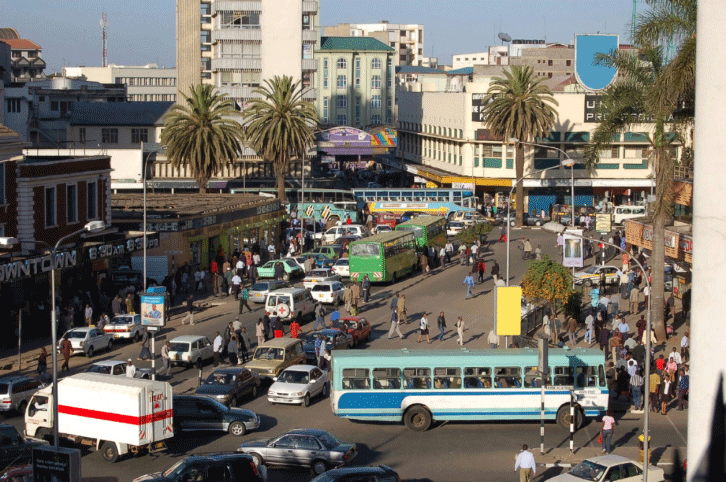
 Danita
Waterfall Brizzi is on the world stage this week as Air Cargo Africa
continues in Nairobi, Kenya. Danita
Waterfall Brizzi is on the world stage this week as Air Cargo Africa
continues in Nairobi, Kenya.
In a bravura presentation part of a roundtable
discussion on Tuesday, this dynamic female airline professional, who
began her career at Pan American World Airways, keeps moving on up while
delivering some straight from the shoulder insights into DL Africa and
some other thoughts and revelations as well.
 “Delta operations to and from Africa have been one of many great
success stories in cargo over the past several years.
“Delta operations to and from Africa have been one of many great
success stories in cargo over the past several years.
“With respect to U.S.-Africa flight offerings, this route is largely
an untapped market.
“Delta is currently the only U.S.-based carrier with operations
to the continent and we feel this gives us a huge jump on our U.S. domestic-based
competition.
“Today in cargo, we see consistently full bellies going both into
and out of destinations like Johannesburg.
“As airport infrastructures keep on improving in destinations
across the continent, Delta Cargo will continue to support the needs
of our customers, who clearly see the business potential between the
two continents.”
“Also, as trade relations between the U.S. and Africa get better,
Delta Cargo will look to expand our cargo business in destinations across
the continent.
“Of course, we believe in Africa and want to be part of the growth
and success story here.
“For 2010, our U.S. to Africa flights averaged 69 percent positional
load factors, while Africa to U.S. flights averaged 33 percent positional
load factors.
“There is a need to champion trade between these two regions of
the world and Delta Cargo plans to support this need in every way possible.
In Africa we already facilitate the import and export of products such
as textiles, automotive parts, fresh produce and seafood.
 |
“Talking Delta Cargo—we saw a large YoY increase of tonnage
between 2009 and 2010.
“There were a number of causal factors to our growth in 2010.
“The signs of recovery from the economic crisis of the past few
years have certainly been a large contributing factor to our recent
success.
“As industries across the board have begun to experience the recovery,
the need for global expedited freight services has grown.
“Leveraging one of the world’s best cargo networks, Delta
has been able to help our customers as their businesses begin to see
these signs of recovery.
“In addition to the economic recovery, a disciplined plan for
maintaining operational efficiency, including a rational approach to
capacity, and a firm commitment to backing our customers’ business
needs with best in class customer service, have had a huge impact on
our division’s success.
“Taking an even wider industry view, global air cargo witnessed
a significant recovery in 2010 from the recent recession, which impacted
all businesses over the past few years.
“Signs of recovery have not only just shown themselves in Delta’s
financial statements this year; however we still have a steep hill in
front of us.
“As IATA has warned, air cargo traffic is expected to slow down
over the next year and a half.
“Delta’s improving revenues, low-cost structure, strong
cash flow and unmatched merger synergies have built a foundation for
an expected solid overall financial performance in 2011.
“Delta has also financially positioned itself well for the future,
with a strong commitment to reducing debt and improving our balance
sheet for the long term.
“By securing this position of effectively curtailing capacity
where necessary, and continuing to provide our customers with best in
class customer service, we believe that we can continue our success
during future economic slowdowns or declines.”
Danita began her aviation career in February 1989, recruited from a
U.S. Master’s degree program in Russian Studies into the Pan American
Airways Management Training Program. After job training and coursework
in New York, Danita received her immersion into Airport Customer Service
for 20 months in Moscow, Russia.
From Russia with love, she was transferred to the European Headquarters
in Frankfurt, Germany as Regional Analyst support for both ACS and Passenger
Sales management through the transition of the Delta acquisition of
Pan Am, which included temporary duty assignments in Belgium, Sweden
and Atlanta.
When DL headquarters moved to London, Danita transferred there into
the position of Manager – Sales Training & Administration,
developing the first passenger and cargo sales training department in
Europe as well as the first European-based Regional Assistant StepUp
program.
In September 1994, Danita was sent back to Moscow, taking over the near-bankrupt
joint venture between Delta and Aeroflot as Executive Director, Delta
Aeroflot Travel Enterprise. While there, she developed the business
into a successful profit center, including the Airport First Class lounge
(which is still there today), Worldspan reservations systems office
and training center, and travel agencies.
In 1996, Danita became the Regional Director – Cargo Sales &
Operations – Europe, Middle East, and India responsible for cargo
sales and operations for 44 online cities in the region and a budget
of USD$185 million.
During that time she shepherded the re-structuring of the former Pan
Am cargo hub and warehouse in Frankfurt, implementing extensive changes
in cargo security, negotiating handling and sales vendor contracts,
creating sales and marketing plans, opening new stations in the Delta
international expansion, and participation in the development and implementation
of the Delta Cargo/Swisscargo Atlantic Cargo Excellence, and later Air
France Cargo alliances.
In July 2009, Danita was promoted to the position of Director –
Cargo Sales & Service – Europe, Middle East, Africa and India,
based in Frankfurt, where she oversees DL staff and General Sales &
Service Agents in 50 online and offline stations in 33 countries.
She enjoys swimming, playing classical piano, teaching Sunday School,
and continues to refine her language skills in Russian, German, Italian
and French.
FlyingTypers is proud to report on this dynamic past and future
air cargo leader and to include this story in our exclusive Women In
Air Cargo series.
Geoffrey/Flossie
|






